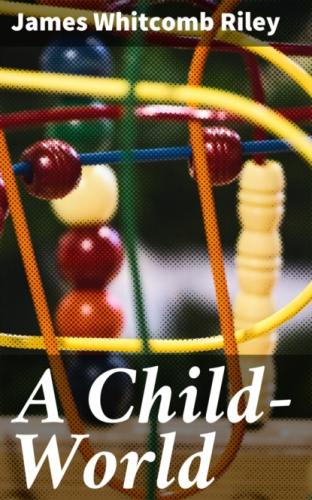THE OLD-HOME FOLKS
Such was the Child-World of the long-ago—
The little world these children used to know:—
Johnty, the oldest, and the best, perhaps,
Of the five happy little Hoosier chaps
Inhabiting this wee world all their own.—
Johnty, the leader, with his native tone
Of grave command—a general on parade
Whose each punctilious order was obeyed
By his proud followers.
But Johnty yet—
After all serious duties—could forget
The gravity of life to the extent,
At times, of kindling much astonishment
About him: With a quick, observant eye,
And mind and memory, he could supply
The tamest incident with liveliest mirth;
And at the most unlooked-for times on earth
Was wont to break into some travesty
On those around him—feats of mimicry
Of this one's trick of gesture—that one's walk—
Or this one's laugh—or that one's funny talk—
The way "the watermelon-man" would try
His humor on town-folks that wouldn't buy;—
How he drove into town at morning—then
At dusk (alas!) how he drove out again.
Though these divertisements of Johnty's were
Hailed with a hearty glee and relish, there
Appeared a sense, on his part, of regret—
A spirit of remorse that would not let
Him rest for days thereafter.—Such times he,
As some boy said, "jist got too overly
Blame good fer common boys like us, you know,
To 'sociate with—less'n we 'ud go And jine his church!" Next after Johnty came His little tow-head brother, Bud by name.— And O how white his hair was—and how thick His face with freckles—and his ears, how quick And curious and intrusive!—And how pale The blue of his big eyes;—and how a tale Of Giants, Trolls or Fairies, bulged them still Bigger and bigger!—and when "Jack" would kill The old "Four-headed Giant," Bud's big eyes Were swollen truly into giant-size. And Bud was apt in make-believes—would hear His Grandma talk or read, with such an ear And memory of both subject and big words, That he would take the book up afterwards And feign to "read aloud," with such success As caused his truthful elders real distress. But he must have big words—they seemed to give Extremer range to the superlative— That was his passion. "My Gran'ma," he said, One evening, after listening as she read Some heavy old historical review— With copious explanations thereunto Drawn out by his inquiring turn of mind— "My Gran'ma she's read all books—ever' kind They is, 'at tells all 'bout the land an' sea An' Nations of the Earth!—An' she is the Historicul-est woman ever wuz!" (Forgive the verse's chuckling as it does In its erratic current.—Oftentimes The little willowy waterbrook of rhymes Must falter in its music, listening to The children laughing as they used to do.) Who shall sing a simple ditty all about the Willow, Dainty-fine and delicate as any bending spray That dandles high the happy bird that flutters there to trill a Tremulously tender song of greeting to the May. Ah, my lovely Willow!—Let the Waters lilt your graces— They alone with limpid kisses lave your leaves above, Flashing back your sylvan beauty, and in shady places Peering up with glimmering pebbles, like the eyes of love. Next, Maymie, with her hazy cloud of hair, And the blue skies of eyes beneath it there. Her dignified and "little lady" airs Of never either romping up the stairs Or falling down them; thoughtful everyway Of others first—The kind of child at play That "gave up," for the rest, the ripest pear Or peach or apple in the garden there Beneath the trees where swooped the airy swing— She pushing it, too glad for anything! Or, in the character of hostess, she Would entertain her friends delightfully In her play-house—with strips of carpet laid Along the garden-fence within the shade Of the old apple-trees—where from next yard Came the two dearest friends in her regard, The little Crawford girls, Ella and Lu— As shy and lovely as the lilies grew In their idyllic home—yet sometimes they Admitted Bud and Alex to their play, Who did their heavier work and helped them fix To have a "Festibul"—and brought the bricks And built the "stove," with a real fire and all, And stovepipe-joint for chimney, looming tall And wonderfully smoky—even to Their childish aspirations, as it blew And swooped and swirled about them till their sight Was feverish even as their high delight. Then Alex, with his freckles, and his freaks Of temper, and the peach-bloom of his cheeks, And "amber-colored hair"—his mother said 'Twas that, when others laughed and called it "red" And Alex threw things at them—till they'd call A truce, agreeing "'t'uz n't red ut-tall!" But Alex was affectionate beyond The average child, and was extremely fond Of the paternal relatives of his Of whom he once made estimate like this:— "I'm only got two brothers—but my Pa He's got most brothers'n you ever saw!— He's got seben brothers!—Yes, an' they're all my Seben Uncles!—Uncle John, an' Jim—an' I' Got Uncle George, an' Uncle Andy, too, An' Uncle Frank, an' Uncle Joe.—An' you Know Uncle Mart.—An', all but him, they're great Big mens!—An' nen s Aunt Sarah—she makes eight!— I'm got eight uncles!—'cept Aunt Sarah can't Be ist my uncle 'cause she's ist my aunt!" Then, next to Alex—and the last indeed Of these five little ones of whom you read— Was baby Lizzie, with her velvet lisp— As
